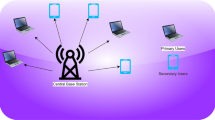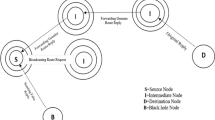Abstract
In this paper, we address the crosslayer problem of joint medium access control (MAC) and routing in ad hoc wireless networks from the novel perspective of stochastic dynamic games. As a starting point to understand the efficient modes of wireless network operation, we look at the basic problem of multi-hop communication over the simple topology of a single relay channel. A stochastic game is formulated for transmitter and relay nodes competing over collision channels to deliver packets to a common destination node using alternative paths. We rely on a reward mechanism to stimulate cooperation for packet forwarding and evaluate the conflicting multiple access and routing strategies of direct communication and relaying through a detailed foray into the questions of cooperation incentives, throughput, delay and energy-efficiency. Under the separate models of selfish and cooperative network operation, we study the interactions among the equilibrium strategies and present a detailed performance analysis based on multiple system parameters that involve the packet arrival rates, throughput rewards, delay and energy costs.
Similar content being viewed by others
References
T. Cover and A. El Gamal, “Capacity theorems for the relay channel,” IEEE Transactions on Information Theory, vol. IT-25, no. 5, pp. 572–584, September 1979.
R.J. La, and V. Anantharam, “A game-theoretic look at the Gaussian multiaccess channel,” DIMACS Workshop on Network Information Theory, Rutgers University, Piscataway, NJ, USA, Mar. 2003.
A.B. MacKenzie and S.B. Wicker, “Selfish users in Aloha: A game theoretic approach,” Proc. Fall 2001 IEEE Vehicular Technology Conference, Atlantic City, NJ, USA, Oct. 2001.
A.B. MacKenzie and S.B. Wicker, “Game theory and the design of self-configuring, adaptive wireless networks,” IEEE Communications Magazine, pp. 126–131, Nov. 2001.
Y. Jin and G. Kesidis, “Equilibria of a non-cooperative game for heterogeneous users of an ALOHA network,” IEEE Communications Letters, vol. 6, no 7, pp. 282–284, July 2002.
E. Altman, R. El-Azouzi and T. Jimenez, “Slotted Aloha as a stochastic game with partial information,” Proc. WiOpt'03: Modeling and Optimization in Mobile, Ad Hoc and Wireless Networks, Sophia-Antipolis, France, Mar. 2003.
A.B. MacKenzie and S.B. Wicker, “Stability of multipacket slotted aloha with selfish users and perfect information,” in Proc. IEEE INFOCOM, San Francisco, CA, USA, Apr. 2003.
Y.E. Sagduyu and A. Ephremides, “Power control and rate adaptation as stochastic games for random access,” Proc. IEEE Conference on Decision and Control, Maui, HI, USA, Dec. 2003.
A. Orda, R. Rom and N. Shimkin, “Competitive routing in multi-user environments,” IEEE/ACM Transactions on Networking, vol. 1, pp. 510–521, Oct. 1993.
S. Buchegger and J.L. Boudec, “Performance analysis of the CONFIDANT protocol,” Proc. ACM International Symposium on Mobile Ad Hoc Networking and Computing (MobiHoc), Lausanne, Switzerland, June 2002.
P. Michiardi and R. Molva, “A game theoretical approach to evaluate cooperation enforcement mechanisms in mobile ad hoc networks,” Proc. WiOpt'03: Modeling and Optimization in Mobile, Ad Hoc and Wireless Networks, Sophia-Antipolis, France, Mar. 2003.
A. Urpi, M. Bonuccelli, and S. Giordano, “Modelling cooperation in mobile ad hoc networks: a formal description of selfishness,” Proc. WiOpt'03: Modeling and Optimization in Mobile, Ad Hoc and Wireless Networks, Sophia-Antipolis, France, Mar. 2003.
V. Srinivasan, P. Nuggehalli, C.F. Chiasserini, and R.R. Rao, “Cooperation in wireless ad hoc networks,” Proc. IEEE INFOCOM, San Francisco, CA, USA, Apr. 2003.
N. Ben Salem, L. Buttyan, J.-P. Hubaux, and M. Jakobsson, “A charging and rewarding scheme for packet forwarding in multi-hop cellular networks,” Proc. ACM International Symposium on Mobile Ad Hoc Networking and Computing (MobiHoc), Annapolis, MD, USA, June 2003.
L. Buttyan and J.P. Hubaux, “Stimulating cooperation in self-organizing mobile ad hoc networks,” ACM Journal for Mobile Networks (MONET), vol. 8, no. 5, pp. 579–592, Oct. 2003.
Author information
Authors and Affiliations
Corresponding author
Additional information
The material in this paper was partially presented at WIOPT’04: Modeling and Optimization in Mobile, Ad Hoc and Wireless Networks, Cambridge, UK, March 2004.
Prepared through collaborative participation in the Communications and Networks Consortium sponsored by the U. S. Army Research Laboratory under the Collaborative Technology Alliance Program, Cooperative Agreement DAAD19-01-2-0011. The U. S. Government is authorized to reproduce and distribute reprints for Government purposes notwithstanding any copyright notation thereon.
Anthony Ephremides received his B.S. degree from the National Technical University of Athens (1967), and M.S. (1969) and Ph.D. (1971) degrees from Princeton University, all in electrical engineering. He has been at the University of Maryland since 1971, and currently holds a joint appointment as professor in the Electrical Engineering Department and the Institute of Systems Research (ISR). He is co-founder of the NASA Center for Commercial Development of Space on Hybrid and Satellite Communications Networks established in 1991 at Maryland as an offshoot of the ISR. He was a visiting professor in 1978 at the National Technical University of Athens, Greece, and in 1979 at the Electrical Engineering and Computer Science Department of the University of California at Berkeley and INRIA, France. During 1985–1986 he was on leave at Massachusetts Institute of Technology and the Swiss Federal Institute of Technology, Zurich. He has also been director of the Fairchild Scholars and Doctoral Fellows Program, an academic and research partnership program in satellite communications between Fairchild Industries and the University of Maryland. He has been President of the Information Theory Society of the IEEE (1987), and served on the Board of the IEEE (1989 and 1990). His interests are in the areas of communication theory, communication systems and networks, queuing systems, signal processing, and satellite communications.
Yalin Evren Sagduyu received his B.S. degree from Bogazici University, Turkey, and M.S. degree from the University of Maryland at College Park in 2000 and 2002, respectively, all in electrical engineering. He is currently working toward his Ph.D. degree at the University of Maryland, where he has been a graduate research assistant with ISR since 2000. His research interests include wireless communication, ad hoc and sensor network design and optimization, stochastic game theory and network coding.
Rights and permissions
About this article
Cite this article
Sagduyu, Y.E., Ephremides, A. A game-theoretic look at simple relay channel. Wireless Netw 12, 545–560 (2006). https://doi.org/10.1007/s11276-006-6534-1
Published:
Issue Date:
DOI: https://doi.org/10.1007/s11276-006-6534-1




